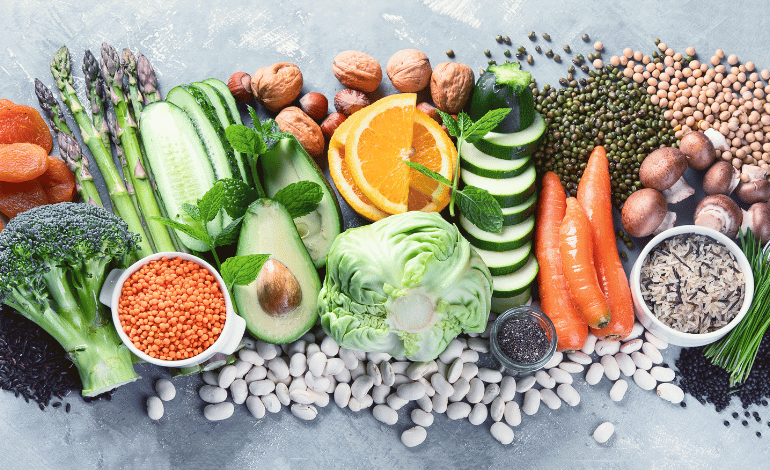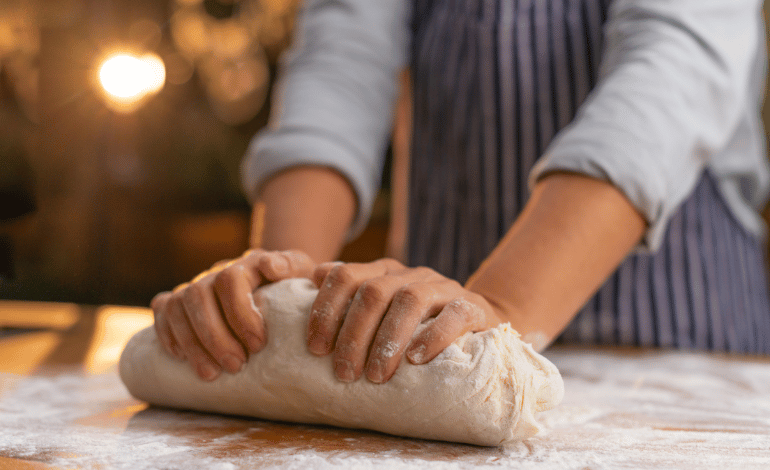Foods To Eat To Lose Weight

Foods To Eat To Lose Weight – Weight loss refers to a decrease in body weight resulting from a reduction in body fat, muscle mass, or fluid. It is often sought after by individuals who are overweight or obese and want to improve their overall health and reduce their risk of chronic diseases such as heart disease, diabetes, and some forms of cancer.
Weight loss can be achieved through a combination of dietary changes, increased physical activity, and behavioral modifications. A diet that is low in calories and high in nutrients, such as non-starchy vegetables, lean proteins, and healthy fats, can help reduce overall calorie intake and promote weight loss. Physical activity, such as cardio and strength training, can also help increase metabolism and burn calories, leading to weight loss.
Eating healthy food is a crucial aspect of any weight loss journey. A diet that is rich in whole, nutrient-dense foods can help you feel full and satisfied, reducing the overall number of calories consumed during a meal. This, in turn, can lead to weight loss.
Here are some vegetarian foods that can aid in weight loss:
1. Whole Grains

Whole grain foods, such as brown rice, quinoa, and whole grain bread, are a great source of fiber and can help you feel full and satisfied. They are also a good source of complex carbohydrates, which can provide sustained energy.
How whole grains can help with weight loss:
-
- High in Fiber: Whole grains are high in fiber, which can help you feel full and satisfied, reducing your overall calorie intake.
-
- Low in Calories: Compared to refined grains, whole grains are generally lower in calories, making them a good option for weight loss.
-
- Slow Digestion: Whole grains are more slowly digested than refined grains, which can help regulate blood sugar levels and keep you feeling full for longer periods of time.
-
- Good Source of Complex Carbohydrates: Whole grains are a good source of complex carbohydrates, which can provide sustained energy and help prevent overeating.
-
- May Boost Metabolism: Some studies have found that consuming whole grains can increase the metabolism, helping the body burn more calories and potentially leading to weight loss.
It is important to note that incorporating whole grains as part of a balanced diet along with regular physical activity is the key to weight loss. Consult with a healthcare provider or registered dietitian before making any significant changes to your diet.
2. Legumes:

Legumes, such as beans, lentils, and chickpeas, are a good source of protein and fiber, which can help you feel full and satisfied. They are also low in calories and high in nutrients.
-
- Low in calories and high in fiber: Legumes are low in calories and high in fiber, making them a great choice for weight loss. The high fiber content helps you feel full and satisfied, reducing the overall number of calories consumed during a meal.
-
- Good source of protein: Legumes are a good source of protein, which is important for weight loss because it helps you feel full and satisfied, reducing the overall number of calories consumed during a meal.
-
- Helps regulate blood sugar: Legumes are slow-digesting carbohydrates, which means that they help regulate blood sugar levels and reduce the risk of overeating and weight gain.
-
- Reduces inflammation: Legumes contain antioxidants and anti-inflammatory compounds that help reduce inflammation in the body, which is associated with weight gain and other health problems.
-
- Supports gut health: Legumes are a great source of prebiotics, which help support gut health and can reduce the risk of weight gain and other health problems. A healthy gut microbiome is important for overall health and weight management.
3. Non-Starchy Vegetables:

Non-starchy vegetables, such as broccoli, cauliflower, and spinach, are low in calories and high in fiber, making them a great option for weight loss. They are also a good source of vitamins and minerals.
-
- Low in calories: Non-starchy vegetables are very low in calories, making them a great choice for weight loss. They are often high in fiber and water, which helps you feel full and satisfied, reducing the overall number of calories consumed during a meal.
-
- High in fiber: Non-starchy vegetables are high in fiber, which helps you feel full and satisfied, reducing the overall number of calories consumed during a meal. Fiber also helps regulate digestion, promoting a healthy gut and reducing the risk of weight gain.
-
- Rich in vitamins and minerals: Non-starchy vegetables are rich in vitamins and minerals, which are essential for overall health and weight management. They are also low in carbohydrates, which can help regulate blood sugar levels and reduce the risk of overeating and weight gain.
-
- Supports metabolism: Non-starchy vegetables contain important nutrients, such as iron, that support metabolism and help the body efficiently burn calories, leading to weight loss.
-
- Promotes a healthy gut: Non-starchy vegetables contain prebiotics, which help support gut health and can reduce the risk of weight gain and other health problems. A healthy gut microbiome is important for overall health and weight management.
4. Nuts and Seeds:

Nuts and seeds, such as almonds, chia seeds, and flaxseeds, are high in healthy fats, fiber, and protein, making them a great snack option for weight loss.
-
- Good source of protein and healthy fats: Nuts and seeds are a good source of protein and healthy fats, which are important for weight loss. Protein and healthy fats help you feel full and satisfied, reducing the overall number of calories consumed during a meal.
-
- Low glycemic index: Nuts and seeds have a low glycemic index, which means that they are absorbed slowly by the body, helping regulate blood sugar levels and reduce the risk of overeating and weight gain.
-
- High in fiber: Nuts and seeds are high in fiber, which helps you feel full and satisfied, reducing the overall number of calories consumed during a meal. Fiber also helps regulate digestion, promoting a healthy gut and reducing the risk of weight gain.
-
- Supports metabolism: Nuts and seeds contain important nutrients, such as magnesium, that support metabolism and help the body efficiently burn calories, leading to weight loss.
-
- Rich in antioxidants: Nuts and seeds are rich in antioxidants, which help reduce inflammation in the body, which is associated with weight gain and other health problems. Antioxidants also help protect the body from damage caused by free radicals, which can lead to weight gain and other health problems.
5. Tofu and Tempeh:

Tofu and tempeh are high in protein and low in calories, making them a great option for weight loss. They are also versatile and can be used in a variety of recipes.
-
- Good source of protein: Tofu and tempeh are both good sources of protein, which is important for weight loss because it helps you feel full and satisfied, reducing the overall number of calories consumed during a meal.
-
- Low in calories: Tofu and tempeh are both low in calories, making them a great choice for weight loss. They are also high in fiber and water, which helps you feel full and satisfied, reducing the overall number of calories consumed during a meal.
-
- Supports metabolism: Tofu and tempeh contain important nutrients, such as iron, that support metabolism and help the body efficiently burn calories, leading to weight loss.
-
- Reduces inflammation: Tofu and tempeh contain antioxidants and anti-inflammatory compounds that help reduce inflammation in the body, which is associated with weight gain and other health problems.
-
- Versatile and convenient: Tofu and tempeh are versatile and convenient foods that can be easily added to a variety of dishes. This makes it easier to include them in your diet, leading to weight loss and other health benefits.
6. Berries:

Berries, such as strawberries, blueberries, and raspberries, are high in fiber and low in calories, making them a great option for weight loss. They are also a good source of antioxidants.
-
- Low in calories: Berries are low in calories, making them a great choice for weight loss. They are often high in fiber and water, which helps you feel full and satisfied, reducing the overall number of calories consumed during a meal.
-
- High in fiber: Berries are high in fiber, which helps you feel full and satisfied, reducing the overall number of calories consumed during a meal. Fiber also helps regulate digestion, promoting a healthy gut and reducing the risk of weight gain.
-
- Rich in antioxidants: Berries are rich in antioxidants, which help reduce inflammation in the body, which is associated with weight gain and other health problems. Antioxidants also help protect the body from damage caused by free radicals, which can lead to weight gain and other health problems.
-
- Supports metabolism: Berries contain important nutrients, such as vitamin C, that support metabolism and help the body efficiently burn calories, leading to weight loss.
-
- Low glycemic index: Berries have a low glycemic index, which means that they are absorbed slowly by the body, helping regulate blood sugar levels and reduce the risk of overeating and weight gain.
It is important to remember that while these foods can help with weight loss, they should be incorporated as part of a balanced diet along with regular physical activity. Consult with a healthcare provider or registered dietitian before making any significant changes to your diet.
In addition, adopting healthy habits such as drinking plenty of water, getting enough sleep, and managing stress levels can also support weight loss. Some people may also choose to use weight loss supplements or undergo weight loss surgery, but it is important to remember that these options should only be considered as a last resort after making lifestyle changes and seeking professional medical advice.
It is important to remember that weight loss should be approached in a healthy and sustainable manner. Rapid weight loss, often achieved through crash diets or extreme caloric restriction, can lead to muscle loss and decreased metabolism, making it difficult to maintain the weight loss in the long term. A slow and steady approach, combined with a balanced diet and regular physical activity, is a more effective and sustainable approach to weight loss.
In conclusion, eating healthy food is an effective way to lose weight. A diet that is rich in whole, nutrient-dense foods, such as non-starchy vegetables, legumes, nuts and seeds, tofu and tempeh, and berries, can help you feel full and satisfied, reducing the overall number of calories consumed during a meal, leading to weight loss. It is important to remember to also practice portion control and engage in regular physical activity for best results.








